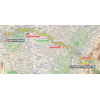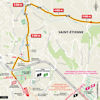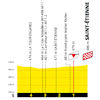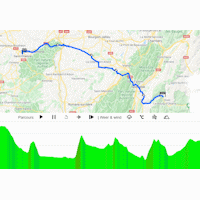Tour de France 2022 Route stage 13: Bourg d’Oisans - Saint-Étienne
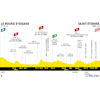
Slideshow 1/8
Friday 15 July - The 13th stage of the Tour de France goes from Bourg d'Oisans to Saint-Étienne. The race adds up to 192.6 kilometres.
Bourg d’Oisans mostly serves as the start hub after a stage to L’Alpe d’Huez. This time is no different. Four editions ago, the race travelled to Valence, where Peter Sagan sprinted to victory. Five years prior, the riders traversed into the high mountains and Rui Costa soloed to triumph in Le Grand Bornand.
We’ll see the riders head out in northeasterly direction. The first 27 kilometres go downhill before the Côte de Brié – 2.4 kilometres at 6.9% – offers KOM contenders a chance to gain some points, after which the route continues on the flat to the foot of the Col de Parménie.
The Parménie is a 5.1 kilometres climb at 6.6%. The route then continues – mostly on narrow, rolling roads – towards the third and last classified climb of the day. The Côte de Saint-Romain-en-Gal is 6.6 kilometres long and averages 4.5%, while the summit is crested with 44 kilometres to go. Moments later the Col de la Croix Régis presents a minor obstacle before the route descends to Rive-de-Gier.
The next 20 kilometres are a rolling false flat to La Talaudière. The riders move through the village with 7.6 kilometres on the flat ahead of them. A sprint finish of a small group is the most likely outcome in Saint-Étienne.
The last Tour de France visit to the capital of the Loire department dates back to 2019. Thomas De Gendt went on a daring exploit in a race with seven climbs and 3,750 climbing metres. Finishing 6 seconds ahead of the chasing duo Thibaut Pinot and Julian Alaphilippe, the Flemish attacker pulled it off and he won from the breakaway.
The first three riders on the line gain time bonuses of 10, 6 and 4 seconds.
Ride the route yourself? Download GPX stage 13 Tour de France.
Another interesting read: results 13th stage 2022 Tour de France.
Tour de France 2022 stage 13: routes, profiles, more
Click on the images to zoom
+ Click for more images (4)
Watch the highlights of recent races here:
Related articles Favourites stage 13: Hilly specialists with fast legs - Tour de France 20 The Route - Tour de France 20 Riders - Tour de France 20 Withdrawals - Tour de France 20 Route and stages - Tour de France 20 GC Favourites - Tour de France 20 More articles Vuelta Femenina 2025: Double triumph for Vollering at Lagunas de Neila
Giro 2025 Route stage 1: Durazzo - Tirana
Giro 2025 Favourites stage 1: Puncher's sprint for pink
Vuelta Femenina 2025 Route stage 6: Becerril de Campos - Baltanás
Vuelta Femenina 2025 Route stage 7: La Robla - Alto de Cotobello
Giro 2025: The Route
Giro 2025: Riders
Giro 2025: GC Favourites
Giro 2025 Route stage 2: Tirana - Tirana
Giro 2025 Favourites stage 2: Chrono specialists to the fore
Giro 2025 Route stage 3: Valona – Valona
Giro 2025 Favourites stage 3: Breakaway day
Giro 2025 Route stage 4: Alberobello – Lecce
Giro 2025 Favourites stage 4: For fast men #1
Giro 2025 Route stage 5: Ceglie Messapica - Matera
Giro 2025 Favourites stage 5: For fast men #2
Giro 2025 Route stage 6: Potenza - Naples
Giro 2025 Favourites stage 6: Hilly race with flat finale
Giro 2025 Route stage 7: Castel di Sangro - Tagliacozzo
Giro 2025 Favourites stage 7: First mountain top finish
Giro 2025 Route stage 8: Giulianova – Castelraimondo
Giro 2025 Favourites stage 8: Attackers in the Apennines
Giro 2025 Route stage 9: Gubbio - Siena
Giro 2025 Favourites stage 9: Strade Bianche alla Giro
Giro 2025 Route stage 10: Lucca – Pisa
Cycling Calendar 2025
Tour de France 2025: The Route
Tour de France 2025 Route stage 1: Lille - Lille
Tour de France 2025 Route stage 2: Lauwin-Planque - Boulogne-sur-Mer
Tour de France 2025 Route stage 3: Valenciennes - Dunkirk

